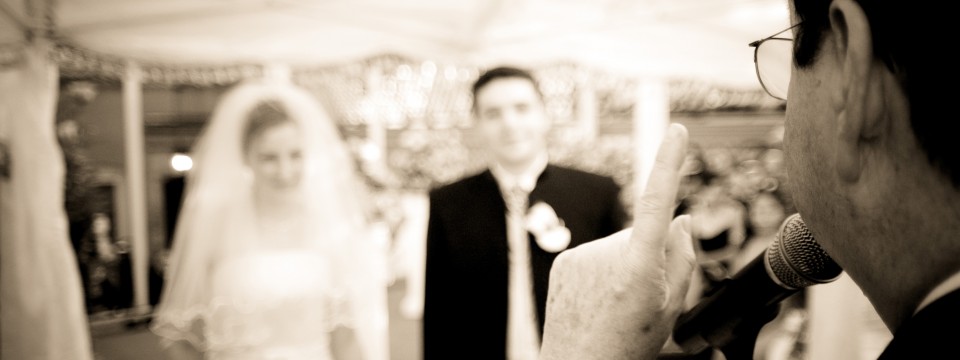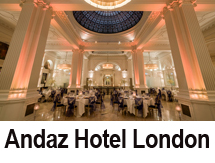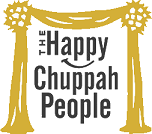The Jewish Wedding Ceremony is a wonderful service that follows Jewish laws and traditions. There is nothing more incredible than witnessing the union of the happy couple in such a beautiful and emotive way. Below takes you through the main constituents observed during a Jewish Wedding Ceremony:
Fasting
It is very common for the Bride and Groom to fast before their wedding day as Jews often do at various times in the year. Similarly when we fast on Yom Kippur – the Day of Atonement, we cleanse ourselves of our sins and start afresh. This same symbolism can be attributed to a Jewish Wedding, where the soon to be married couple would fast and start their married life clean.
Signing the Marriage Contract
Before the Jewish ceremony begins, the Ketubah which is the Jewish marriage contract, is signed. The Groom agrees to be bound by the terms of the marriage contract. The Ketubah details the obligations of the Groom to the Bride and is signed by 2 witnesses as well. For more information click on What is the Ketubah?
Badeken
Also prior to the main ceremony beginning, the Groom will be escorted to see the Bride so he can verify that she is indeed, the person he would like to marry. He will place the veil over the Bride’s face ready for the procession into the synagogue/venue. In Biblical times, Jacob was tricked into marrying Leah and not Rachel who he had wanted to marry, as her face was covered. So this is why this tradition now exists in modern times. For more information click on What is the Badeken?
The Procession
The Bridal procession will enter the synagogue/venue. There can be as many people as you like in the procession. But it usually includes, the Rabbi, the Groom with his parents or best man, the bridesmaids and finally the Bride with her parents. The procession will be accompanied by a choir and/or chazzan singing.
The Chuppah
The Chuppah is definitely one of the most important Jewish Wedding Ceremony traditions. A Chuppah is a cloth canopy supported by 4 poles and is where the Bride & Groom stand underneath and become married. It symbolises the new home and is open at all sides to welcome guests. It may be simple or elaborately decorated. For more detailed information, click What is a Chuppah?
The 7 circles
On reaching the Chuppah, the Bride walks around the Groom 7 times, or sometimes 3 times. There are many explanations for this traditional act, including the 7 days it took G-d to create the world, and the 7 wedding blessings that are recited. Click on the link Why does the Bride circle the Groom 7 times for more detailed information.
Betrothal
This comprises a blessing over wine, another blessing of mutual commitment and the gift of a ring to the Bride. The wine is tasted by the couple. The ring is placed on the index finger of the Bride’s right hand. The complete circle of the ring symbolises the endless bond between husband & wife. Once the ring is placed on the Bride’s finger, the couple are considered married in Jewish law.
Ketubah
This is signed earlier by the Bride & Groom and is now read out aloud for all to hear.
Sheva Brachot (The 7 Blessings)
These are 7 blessings that are sung over a glass of wine for the couple to be blessed with happiness, love, harmony & peace in the Jewish Wedding Ceremony. The blessings are recited by the Rabbi, Chazzan or guests who are important to the Bride & Groom. The wine is drunk after the last blessing is recited. For more detailed information read The Sheva Brachot.
Breaking the Glass
The Groom stamps on a glass which ends the Jewish Wedding Ceremony. This reminds everybody to not forget the destruction of the Temple in ancient times, nor to forget the suffering of others, even on this joyous day. Traditionally everyone shouts “Mazel Tov”! For more detailed information read The Jewish Wedding & Breaking the Glass.
Certification
The Bride & Groom together with their witnesses will go & sign the civil marriage documents.
Yichud
This is when the Bride & Groom will spend their first few moments alone as husband and wife after the ceremony. It is believed that seclusion is necessary to complete the Jewish Wedding ceremony. Many years ago, it is believed that this would be when the married couple would consummate their marriage, but nowadays, the couple will enjoy some quiet time and some food, if they have been fasting before they greet their guests at their wedding reception. Click on the link What is Yichud at a Jewish Wedding? for more detailed information.
For some other useful information, click here:
Jewish Wedding Music
Jewish Wedding Songs
Jewish Wedding Checklist
Jewish Wedding Bands
Jewish Wedding Venues








